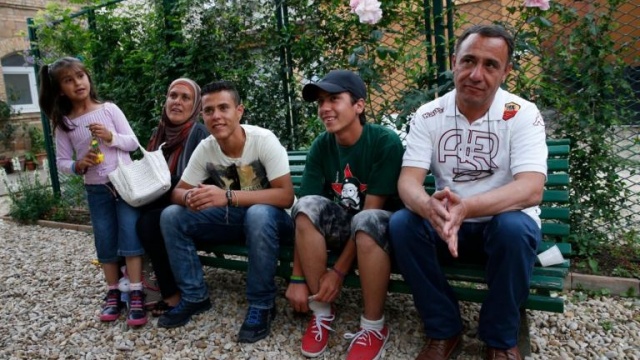

Proposing the Positive and the Pastoral: Chapter Two of Amoris Laetitia
Julian Paparella
Tuesday, August 14, 2018

CNS photo/Paul Haring
Reflecting on the Second Chapter of Pope Francis' Apostolic Exhortation on Love in the Family
“We have long thought that simply by stressing doctrinal, bioethical and moral issues, without encouraging openness to grace, we were providing sufficient support to families, strengthening the marriage bond and giving meaning to marital life. We find it difficult to present marriage more as a dynamic path to personal development and fulfillment than as a lifelong burden… We have been called to form consciences, not to replace them… Yet we have often been on the defensive, wasting pastoral energy on denouncing a decadent world without being proactive in proposing ways of finding true happiness” (Amoris Laetitia 37-38).With these powerful sentences, Pope Francis sets out an approach to the modern family that is at once positive and pastoral. In the second chapter of Amoris Laetitia, “The Experiences and Challenges of Families,” Pope Francis begins by noting that, “the welfare of the family is decisive for the future of the world and that of the Church” (31). He thus considers the concrete realities and current problems facing families and exhorts the Church to contribute constructively to solutions rather than simply calling out shortcomings. Pope Francis courageously admits that, “Many people feel that the Church’s message on marriage and the family does not clearly reflect the preaching and attitudes of Jesus, who sets forth a demanding ideal yet never failed to show compassion and closeness to the frailty of individuals like the Samaritan woman or the woman caught in adultery” (38). The modern technological age provides further challenges to the formation of families, proposing a “culture of the ephemeral” where we move rapidly from relationship to relationship, connecting and disconnecting in a way that “blocks,” “disposes,” and “uses” others, and rendering ourselves “incapable of looking beyond themselves” (39). Loneliness is also an obstacle to family life, “arising from the absence of God in a person’s life and the fragility of relationships” (43), exacerbating a culture of promiscuity and preventing people from the sense of encounter that leads to meaningful relationships. In such a cultural context, “We need to find the right language, arguments and forms of witness that can help us reach the hearts of young people, appealing to their capacity for generosity, commitment, love and even heroism, and in this way inviting them to take up the challenge of marriage with enthusiasm and courage” (40). The pope is not blind to very real problems facing families across the globe. Unemployment and obsession with work, poverty and lack of affordable housing, polygamy and the mistreatment of women, addictions and substance abuse, migration caused by political conflicts and economic instability – all threaten the flourishing of the family and can even lead families to break up through divorce or separation. “In such difficult situations of need, the Church must be particularly concerned to offer understanding, comfort and acceptance, rather than imposing straightaway a set of rules that only lead people to feel judged and abandoned by the very Mother called to show them God’s mercy. Rather than offering the healing power of grace and the light of the Gospel message, some would ‘indoctrinate’ that message, turning it into ‘dead stones to be hurled at others’” (49). Here Pope Francis manifests his desire for a Church that is a field hospital in the middle of a battlefield, not an elite enclave of the pious and perfect. Healing wounds. Prescribing the medicine of mercy. Meeting people where they’re at and not simply pointing to where they “should be.” Leading people to God instead of lamenting a presumed godlessness. In a way, Pope Francis is proposing the approach that Jesus provides by giving us the Beatitudes: transcending commandments of negation (“Thou shall not…”) to provide a positive call to holiness and happiness that blesses without judging. With him, let us “seek new forms of missionary creativity” and “offer a word of truth and hope” (57). In so doing, may we transform with the charity of Christ and the grace of the Gospel a world challenged in so many ways.
Related Articles:
<<













